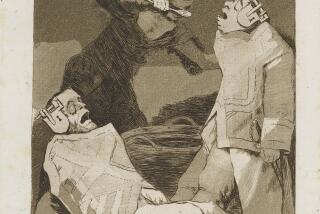Grand Old Men of Letters : THE COMPLETE ESSAYS, <i> By Michel de Montaigne (Viking: $60; 1,269 pp.)</i>
We are awash in the era of the essay in the cult of the essay. In our newspapers and our magazines, on our airwaves, between covers hard and soft, the current proliferation of the essay certifies the notion that every thought, no matter how stray, is eminently airable. The cult of the essay is really the cult of personality; the particular popularity of the “personal” essay, rife with the superannuated Me Generation fulminations of the Robert Fulghums and the Alice Kahns, represents a narcissist’s swoon-a-thon in which any ego can play.
The appearance of a new edition of the complete essays of Michel de Montaigne, translated and annotated by Oxford scholar M. A. Screech (a name to tickle a Monty Pythonite!), should go a long way in redeeming the “personal” essay for a generation untutored in the richness of the form. Montaigne was not only its inventor but also its greatest practitioner; he justified the essay not because he deigned to voice his own piping philosophies and innermost musings but because he contained within himself the protean dimensions of all mankind. His essays proceed from man to Man.
Montaigne first published his “Essays” in 1580, when he was 47, adding new editions in 1582 and 1588, four years before his death. He came late to writing--later, perhaps, than any other comparable literary giant. He sometimes regrets in his “Essays” that he didn’t begin his project earlier, but maybe the riches needed to be stored up before they could spill over.
By the time Montaigne retreated with his wife to his family estate to read and meditate and write his essays--he had previously studied law at the University of Toulouse and served on the parliament of Bordeaux--he had already absorbed the humors and horrors of the Late Renaissance. His worldview was bracketed by the explorations of the New World, which deepened his far-flung sympathies and fascination for the human condition, and by the wars of religion, with their protracted cruelties.
Although the popular image of Montaigne is that of a solitary, almost ascetic scrivener ensconced in his tower lined with thousands of books and decorated with an ever-changing array of Greek and Latin inscriptions, he was far from a hermit. He ran his estate; he traveled to Germany, Italy, Austria. (His notebooks were published in 1774 as “ Journal de Voyage, “ the only non-essay writings, except for some letters, in the Montaigne canon.) Like his father before him, he was elected mayor of Bordeaux. He became the confidant of both Henry III and Henry IV.
“I myself am the subject of my book,” writes Montaigne in his opening note to the reader, quickly adding, “It is not reasonable that you should employ your leisure on a topic so frivolous and vain.”
This is a classic double-whammy from Montaigne: the stout proclamation followed by a self-deprecating blush. It’s a coy tactic, but throughout the essays, Montaigne’s immodest modesty has an endearing genuineness. He can’t hold back from the thrill of what he is doing, the sheer novelty of it, and as the essays accumulate and resound and become increasingly personal, his philosophical forays and digressions--on everything from cannibals to friendship to children’s education to thumbs--begin to cohere and circulate about each other. As mammoth as the collected essays are--more than 1,200 tightly packed pages in the Screech edition--they form a unified field of experience. They take on the shape of a human life. We grow old with Montaigne, and his deepening presence is like a balm.
No matter how loftily his essays are billed, Montaigne recognizes in the mundane particulars of our lives the sweetmeats of existence. He was a celebrant--a sensualist--of our routine humors: of our habits, our vanity, our melancholy. Montaigne is perhaps the one great exemplar of sanity in literature, the most voluminous demonstration of how art can reside in the quotidian. Yet--and this is a quality even his admirers sometimes miss--he had a profound tragic sense. (That’s why we trust his sanity.) His credo may have been that “The greatness of the soul is dignified in the Mean,” but he was painfully aware of the treacheries on either side of that mean. There is no more sorrowful passage in literature than the brief paragraph that closes the essay “On Coaches,” with its description of the Spanish army’s capture of the King of Peru as he was “borne seated on a golden chair suspended from shafts of gold.” Each sentence follows the next like a deadfall, as the slaughter takes hold and then abruptly passes from our eyes.
‘I am better at friendship than anything else,” Montaigne writes in one of the earliest essays (“On Liars”), and it was a loss, through death, of a great friendship with fellow parliamentarian Etienne de la Boetie that encouraged Montaigne to retreat inside himself. Dutiful Renaissance man that he was, Montaigne peppers his essays liberally with borrowings from antiquity, but his spiritual muses were not really Plutarch and Plato: Etienne and Montaigne’s beloved father are his true touchstones. They recur like revenants throughout the work.
The friendship Montaigne creates with us is based on an extraordinary directness and honesty; his study of the weakness of others is almost always a prelude to a study of his own. He pinned much of man’s voyagings on the vagaries of Fortune, but his comprehension of the totality of the human condition makes his “Essays,” in addition to everything else, the first great breakthrough in modern psychology. “We are fashioned out of oddments put together,” he wrote, and he exulted in the alloy of elements, the maddening polarities, that went into making up a man. Despite his Catholic faith, he had an almost pantheistic openness to experience. Like any good ex-lawyer, he disdained the law: “Nature always gives us happier laws than those we give ourselves.”
The enormity of Montaigne’s achievement creeps up on us because he’s not a pontificator or even a philosopher, really; you could fill half of “Bartlett’s” with his quotations but, ripped out of the amble and ramble of the essays, Montaigne’s pensees don’t begin to suggest the book’s value. Montaigne was no La Rochefoucauld, nor, as he once feared, does his volume survive as an ornament in a ladies’ salon.
Montaigne’s great creation was, in effect, himself--the universe of possibilities he contained. And he conveyed those possibilities in a limpid, unvarnished prose that was all of a piece with the mettle of his mind. For us, the unassuming directness of Montaigne’s prose is a gesture of amity; he wants to be understood, he wants to be recognized for telling the truth, because, for Montaigne, truth-telling is the highest moral good. He is forever on the lookout for anything in his writing that smacks of cant or pretense, because he wants nothing phony to intercede between us. He doesn’t want to rattle the communion.
To some extent, Montaigne’s “honesty” was, of course, a literary effect: He tells us very little, for example, about his wife, his political participations, his religion. But the effect has its own integrity beyond the particular evasions of Montaigne’s work. And perhaps we would trust him less if he pretended to “tell all.”
One explanation for Montaigne’s amazing candor is his unmasked delight in himself; he insisted that in any just consideration of man, the body is at least equal to the soul, and so we are treated to all manner of descriptions about the kidney stones which plagued him; about the raptures of sexual intercourse; about how he eats ravenously with his hands (“In my haste I often bite my tongue and occasionally I bite my fingers”). He informs us matter-of-factly that “My bowels and I never fail to keep our rendezvous.” (The “Essays,” incidentally, is probably the greatest bathroom book ever written, except it’s too heavy.)
Montaigne’s preoccupation with bodily experience was tagged to his central preoccupation with death and dying. Early in the “Essays” he adopts a stoical posture when he writes that life’s continual task is to build for death--for the separation of the soul from the body. But in one of his later essays, “On Repenting,” he writes: “It is my conviction that what makes for human happiness is not, as Antithenes said, dying happily but living happily”--and we want to cheer. Death is the great subject of the “Essays” because it informs everything, cuts across everything.
Montaigne’s attitude toward his own death (summed up in his final, sublime essay “On Experience”) was by turns raggedy, beseeching, cranky, philosophic. The book is both a fortification against mortality and a coming to terms with it. It shouldn’t matter to our response to the “Essays”--but it does--to know that Montaigne died peacefully, surrounded by his friends and family, while hearing Mass in his room.
More to Read
Sign up for our Book Club newsletter
Get the latest news, events and more from the Los Angeles Times Book Club, and help us get L.A. reading and talking.
You may occasionally receive promotional content from the Los Angeles Times.






